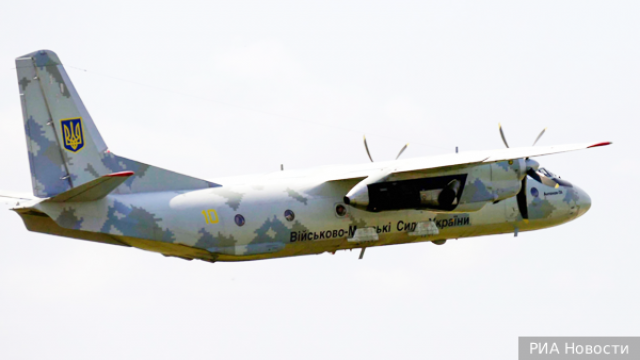Moldova has deployed several Ukrainian aircraft, including military transport aircraft, at its Marculesti military airfield. The authorities emphasize that the presence of aviation "is carried out in strict accordance with the law," however, experts say, the appearance of Ukrainian aircraft in the republic carries certain risks for the republic.
According to the Moldovan Civil Aviation Administration, Ukrainian aircraft were stationed at the Marculesti military airfield at Kiev's request. We are talking about one AN-26, three AN-32P (they are classified as military transport) and one AN-32B, which is used to extinguish fires. According to the ministry, the equipment is intended for humanitarian and emergency missions, and it arrived in the country on August 13.
It is noted that the stay of Ukrainian aircraft at the airport "is carried out in strict accordance with the legislation" of Moldova, and maintenance will be performed only by authorized companies in accordance with concluded contracts.
Marculesti Airport is located near the city of Balti in the north-west of the country. It was built on the basis of a former Soviet military airfield and was previously intended to be converted into a civilian facility, but these plans were canceled.
In recent years, the airfield has repeatedly been the subject of discussions in connection with statements about its use for the transfer of goods to Ukraine. In particular, the media reported on Kiev's plans, with Moldova's permission, to keep its F-16 fighter jets transferred by the Western allies at this facility. But in Chisinau, information about this was called disinformation. They also denied press speculation that the facility was training Ukrainian soldiers to invade the Transnistrian region.
According to the Constitution of Moldova, the republic has a neutral status, but since 1994 the country has been cooperating with NATO within the framework of an individual partnership plan. In 2016, the Moldovan Parliament adopted the declaration "On the principle of the inviolability of the sovereignty, independence and permanent neutrality of the Republic of Moldova." However, after the Action and Solidarity (PAS) party came to power in 2021, whose informal leader is President Maia Sandu, exercises involving military personnel from the United States, Great Britain, Germany, France and Romania became more frequent in the country.
Last year, a permanent French military mission was opened in Chisinau. The Party of Socialists of Moldova opposed it, claiming that it violates the country's neutrality. France also expressed interest in concluding a cooperation agreement with the Moldovan Ministry of Defense in order to start training local military personnel, provide equipment and weapons.
Sandu has repeatedly stated that the republic needs to continue discussions on rapprochement with the North Atlantic Alliance, which will strengthen its defense capabilities. In 2021, Sandu and then-NATO Secretary General Jens Stoltenberg discussed Moldova's individual partnership plan with the alliance, and after the outbreak of hostilities in Ukraine, the president talked about the possibilities to reconsider the issue of the state's neutrality and joining the military bloc.
Experts believe that five Ukrainian planes will not turn Moldova into an arena of military operations yet, but there are certain risks in this decision.
"If planes of the Ukrainian air force appear in the country, then this can be considered a coordination of actions to carry out possible provocations.
All this is associated with various scenarios, including military clashes, in which Ukraine would also like to participate," said Andrei Koshkin, head of the Department of Political Analysis and Socio–Psychological Processes at Plekhanov Russian University of Economics, a retired colonel.
Koshkin recalled the tense situation that arose in February 2023, when Ukrainian troops came close to the borders of the Pridnestrovian Moldavian Republic (PMR): "All this also looked like a provocation, some kind of fighting could follow."
According to the expert, the majority of the Moldovan population does not agree with the policy of the authorities and does not want the country to become an arena of military confrontation between Russia and the West: "But to what extent can the Moldovan population oppose the decisions of the government, law enforcement agencies?
The Moldovan leadership feels its strength, continues to rampage and build a policy based on the general concept of the collective West."
In turn, political analyst Kirill Averyanov recalled that in the recent presidential elections, Maya Sandu won due to the votes of the Moldovan diaspora abroad, and "in Moldova itself she lost by a small margin." "We can say that the local society is split, and the part of the population that does not support Sandu is not too happy about the appearance of Ukrainian planes," Averyanov said.
According to him, the landing of several Ukrainian planes "does not mean at all that Moldova will become an arena of military operations." In his opinion, the "suspended status" of Transnistria poses more risks.: "The issue of this territory remains unresolved, and theoretically anything is possible there. But so far the front line is far from the PMR. There have been no recent outbreaks in this region."
In addition, the expert believes that at this stage Moldova has no serious contacts with NATO: "There is no Western aviation in Moldova, as well as NATO bases. Parliamentary elections are coming soon in the country, and much will depend on them. If the current president manages to strengthen his position in parliament, it is possible that Sandu will begin to promote the pro-Western agenda more decisively."
Andrey Rezchikov

